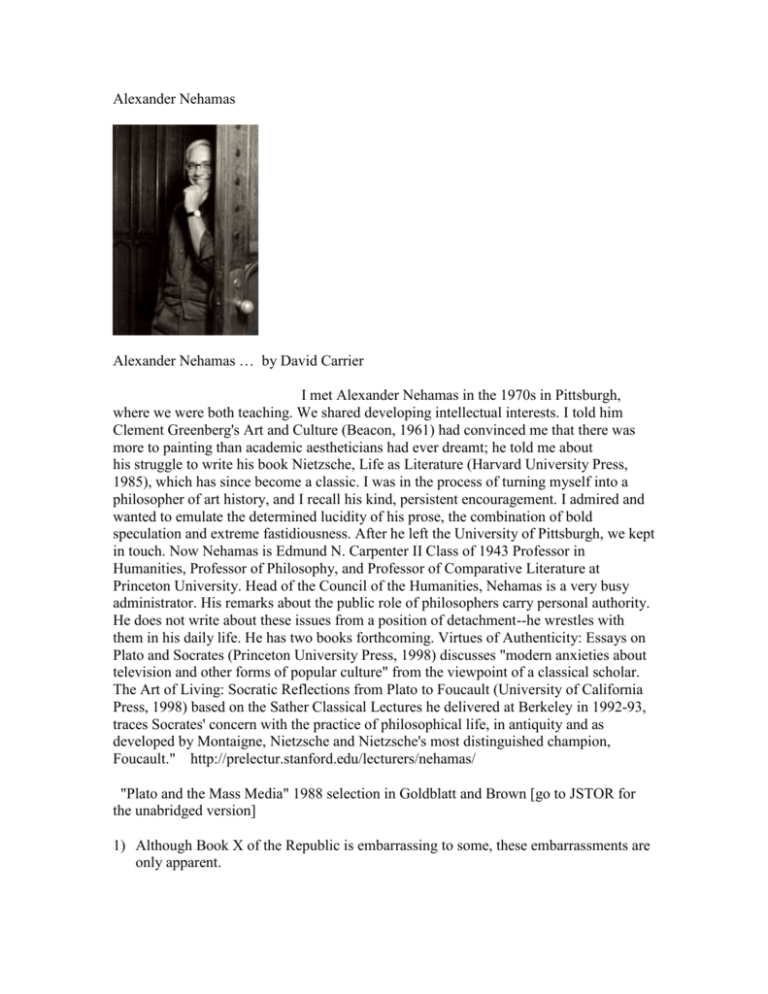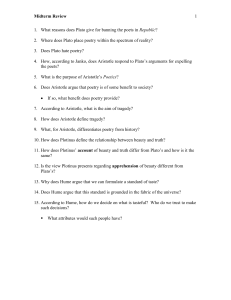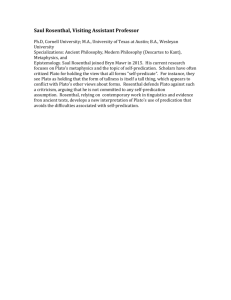Alexander Nehamas "Plato and the Mass Media"
advertisement

Alexander Nehamas Alexander Nehamas … by David Carrier I met Alexander Nehamas in the 1970s in Pittsburgh, where we were both teaching. We shared developing intellectual interests. I told him Clement Greenberg's Art and Culture (Beacon, 1961) had convinced me that there was more to painting than academic aestheticians had ever dreamt; he told me about his struggle to write his book Nietzsche, Life as Literature (Harvard University Press, 1985), which has since become a classic. I was in the process of turning myself into a philosopher of art history, and I recall his kind, persistent encouragement. I admired and wanted to emulate the determined lucidity of his prose, the combination of bold speculation and extreme fastidiousness. After he left the University of Pittsburgh, we kept in touch. Now Nehamas is Edmund N. Carpenter II Class of 1943 Professor in Humanities, Professor of Philosophy, and Professor of Comparative Literature at Princeton University. Head of the Council of the Humanities, Nehamas is a very busy administrator. His remarks about the public role of philosophers carry personal authority. He does not write about these issues from a position of detachment--he wrestles with them in his daily life. He has two books forthcoming. Virtues of Authenticity: Essays on Plato and Socrates (Princeton University Press, 1998) discusses "modern anxieties about television and other forms of popular culture" from the viewpoint of a classical scholar. The Art of Living: Socratic Reflections from Plato to Foucault (University of California Press, 1998) based on the Sather Classical Lectures he delivered at Berkeley in 1992-93, traces Socrates' concern with the practice of philosophical life, in antiquity and as developed by Montaigne, Nietzsche and Nietzsche's most distinguished champion, Foucault." http://prelectur.stanford.edu/lecturers/nehamas/ "Plato and the Mass Media" 1988 selection in Goldblatt and Brown [go to JSTOR for the unabridged version] 1) Although Book X of the Republic is embarrassing to some, these embarrassments are only apparent. a) Plato’s so-called attack on poetry is better understood as a specific social and historical gesture. b) Placing them in their original context makes his criticisms relevant today. 2) Plato allows Guardians to imitate not only good characters but bad ones if they do so "in play" in order to ridicule them: he forbids imitativeness, i.e. imitation of anything independently of its moral quality, not imitation in general. a) He bans all mimetic poetry. He does not ban all imitation. 3) Plato ends the Republic in a discussion of aesthetics: his concern with poetry is mainly ethical, although also ontological and epistemological. a) Plato: if we allow poetry in the city, pleasure and pain will rule instead of law and rational principle. b) But, many argue, there is more to art than the ethical dimension, and ethically, it is not that harmful. 4) Plato's attitude is evident in our current thinking about the arts, though not about epic and tragic poetry. 5) Plato is not concerned with art as such. a) The concept of fine arts only emerged in the 18th century. b) He does not actually ban painting and sculpture. 6) He bans poetry because it is suited to representation of vulgar and shameful subjects, especially for a festival crowd: even the best people are vulnerable to its harmful influence. a) We share the hero's feelings of sorrow [e.g. Oedipus]. b) But in life we praise the control of emotions, not their indulgence. c) The appetitive part of the soul is only concerned with immediate gratification and it delights in shameful behavior. d) In poetry, the rational part indulges the appetitive part, thinking it harmless. e) But enjoying feelings of pity in others encourages us to [find no shame in indulging in our own self-pity]. f) It places sex, anger, desires, pleasure, and pains in charge of our soul, but it would be better that [they obey the rational part]. 7) Plato’s assumption: our reactions to life follow our reactions to poetry. a) Yet, some would argue, enjoying Medea is not likely to make us admire mothers who murder their children. b) But Plato's prohibition would apply to children, who, most would agree, should not imitate bad models. c) "imitations, if they last from youth….become part of one's nature" Plato d) Aristotle even agrees we should not allow youth to see comedy. 8) Aristotle defends poetry mostly because he thinks it actually beneficial. a) katharsis excites and purifies emotions evoked by portrayal of events that would evoke the same response in reality. b) But, unlike Plato, he believes it benefits us. 9) Perhaps children often treat representations simply as parts of reality. 10) Plato believes [thinks Nehamas] that adults' reactions to poetry influence their reactions to reality too because they are the same kind of reactions, as the representations of poetry are at least superficially the same as the things they represent. 11) TV a) Minnow in 1961: there is a vast wasteland on TV b) Gerbner and Gross: television presents a world of clarity and simplicity, unlike the real world: also violent c) Mander: television is suited for expressing hate, fear, jealousy, and onedimensional joyfulness: like Plato, he believes we slowly evolve into these images d) TV, it is said, tends to encourage sex, violence, and other antisocial behavior e) Booth: the quality of the self during the viewing is resistant to any elevation of quality in programs f) Arnheim: TV is a mere instrument of transmission of the world as it is, its appearance [and cannot be an art, since arts interpret reality] g) Postman: TV requires minimal skills, and is largely aimed at emotional gratification, and causes spiritual devastation h) In general the attack is identical to Plato's attack on epic poetry. i) The contempt for TV is well-deserved. 12) Yet classical Greek poetry determines many of the criteria that determine the literary canon in our culture: is it really like TV? 13) Plato was not attacking art as such: he produced his own works of art, the dialogues. a) His arguments are not against poetry as a fine art but as what it was then, popular entertainment. [Leddy: yet it was even more a form of religious festival] b) Theater under Pericles was free: 17000 people would attend in the Greater Dionysia festival in Athens. c) The audience would whistle, eat food, pelt actors with food, and shout. d) Drama was considered a realistic representation: women were frightened into miscarriages. 14) Even though theater may contain hints towards its artificial nature, these hints are not consciously perceived in popular entertainment. a) Popular entertainment is generally taken to be inherently realistic. b) It is taken to represent reality without artifice or mediation. c) Realistic art is thought to be transparent, although it is not. d) Theater is perceived as reality pure and simple, at least for the moment. e) Yet mediation and convention are essential to all representation. f) When mediation and convention are attributed to the subject matter they appear as distortion. g) So the reality represented, while the media are still popular, is considered distorted. h) This leads to campaigns to abolish or reform the popular arts. i) The audience enjoyment of the popular arts is thought to be enjoyment of a distorted, perverted reality, which contributes to a distorted life. 15) There was no concept of fine arts as the province of a small enlightened audience. a) Plato's view is disturbing because we still agree with him that representation is transparent at least in the case of media like TV which are not fine arts, and who's own nature is not a subject of its own. b) No one believes that the fine arts produce such duplications of real life: they bear an indirect, interpretative relationship to the world, and need further interpretation. Is Nehamas right in his interpretation of Plato? Is he right that we interpret TV as transparent? What is his theory of fine art?






